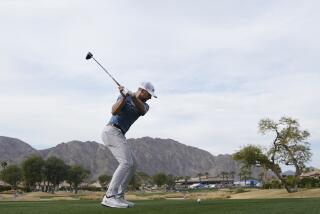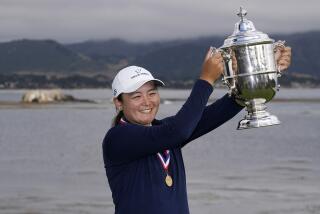Baby Steps to the Tour
- Share via
Professional golf’s landscape is littered with phenom flameouts, amateur world-beaters who could not make it on the PGA Tour. For every Tiger Woods and Phil Mickelson, there are dozens of former college stars who faded into the anonymity of club professional or been relegated to far-flung tours with small purses.
Ricky Barnes has no intention of fading into anything. “It’s been a lot slower getting to where I want to go,” says the 2002 U.S. Amateur Champion and two-time All American at Arizona. “[But] I know I’m going to get to the big tour.”
Since his meteoric brush with golf royalty -- he followed his amateur title with a flashy 21st-place finish in the 2003 Masters (one shot behind Woods) -- the 26-year-old Barnes has toiled in the rough of golf’s minor leagues. And though things are finally looking promising, he has yet to hack his way out.
Over the last three years, he has failed to qualify for the PGA Tour through the masochistic ordeal known as Q school. “If you have one bad week around Q school,” he says, “that makes the mountain a lot steeper.”
That forced him to take the more circuitous route of the Nationwide Tour, where the top 20 players on the money list each year get promoted to the PGA Tour for the following year. Riding a Nationwide-best 18 consecutive cuts made, Barnes is among those who will compete this week at the Mark Christopher Charity Classic at Empire Lakes Golf Course in Rancho Cucamonga.
With five tournaments left this year, Barnes is 30th on the money list, about $35,000 away from the No. 20 spot. “I’m in striking distance,” he says.
A few years ago, Barnes was a flamboyant young gun who many thought might be Woods’ next big challenger.
“I had early success,” he says, “and like a lot of others, thought that I should be out there [on the Tour] right away.”
If there’s one thing he has learned in the last few years, though, it is patience.
“It’s tough to be patient when you taste the dessert before dinner,” he says. “Now I’m kind of just getting to the appetizers.”
Barnes is careful not to chow down too quickly. “Instead of a course record, I just want to shoot a good round and finish in the top two or three,” he says, “maybe even steal a win.”
After consulting with “a bunch of” sports psychologists, Barnes has changed his approach to the game. “I’ve won a lot of tournaments kind of freewheeling it, but [now] I’ve slowed down everything on the course,” he says. “You go for things too early and you get ahead of yourself -- you start playing shots before you take them.”
He has also turned to high-profile instructor Peter Kostis to “tweak” the mechanical parts of his swing, which Barnes describes as an “athletic swing with a lot of moving parts. But those moving parts put my body and my club into some very good positions.”
Kostis’ assessment is not so kind. “Let’s just say that Ricky succeeded despite his fundamentals.” And when Barnes tried to make it on tour, Kostis says, “it caught up with him.”
Kostis has strengthened Barnes’s grip, straightened his posture and aim and turned him down a notch. “Ricky [has progressed to] about a 9.2 on a scale of 10. I’m really proud of him.”
Barnes says he knows he can play with tour players. “I’ve proven it before,” he says.
But he adds that, “The more you rush and think about [making the Tour], the less chance you have.
“When it’s time for me to be out there, then it will happen. I’m willing to wait.”
More to Read
Go beyond the scoreboard
Get the latest on L.A.'s teams in the daily Sports Report newsletter.
You may occasionally receive promotional content from the Los Angeles Times.










